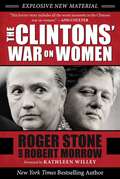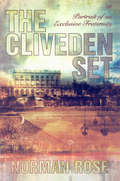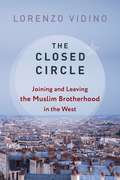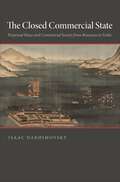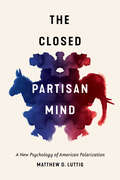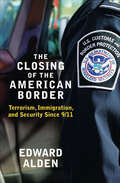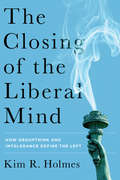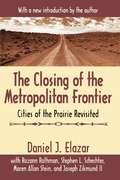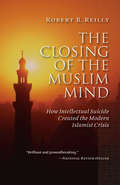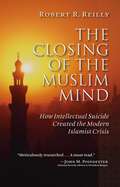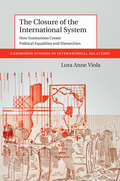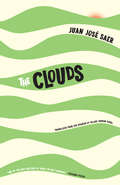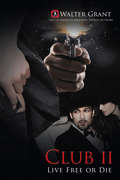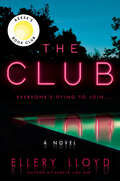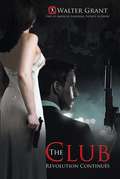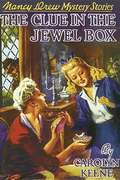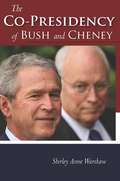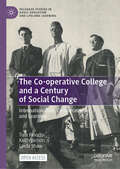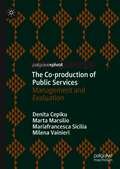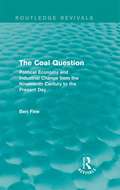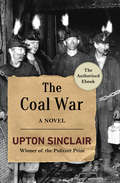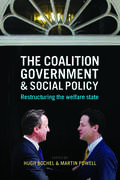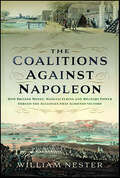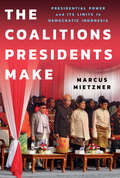- Table View
- List View
The Clintons' War on Women
by Robert Morrow Roger Stone"This book on Hillary - really tough." - President Donald TrumpHillary Clinton is running for president as an "advocate of women and girls,” but there is another shocking side to her story that has been carefully covered up-until now. This stunning exposé reveals for the first time how Bill and Hillary Clinton systematically abused women and others-sexually, physically, and psychologically-in their scramble for power and wealth.In this groundbreaking book, New York Times bestselling author Roger Stone and researcher and alternative historian Robert Morrow map the arc of Bill and Hillary’s crimes and cover-ups. They reveal details about their actions in Arkansas, during Bill Clinton’s time in the White House, about who really ordered the deadly attack on the Branch Davidian compound in Waco, during Hillary’s tenure as secretary of state, about their time at the Clinton Foundation, and during Hillary’s current campaign for president.This is the first book to shed light on the couple’s deeply personal violations of the people they crushed in their obsessive quest for power. Along the way, Stone and Morrow reveal the family’s darkest secrets, including a Clinton family member’s drug rehab treatment that was never reported by the press, Hillary Clinton’s unusually close relationship with a top female aide, and a stunning revelation of such impact that it could strip Bill Clinton of his current popularity and derail Hillary’s push to be the second Clinton in the White House.Anyone who cares about the future of the United States will want to read this tell-all, exposing the appalling, unvarnished, and ugly truth about the Clintons. This paperback edition includes a new preface from Roger Stone, revealing explosive new information he’s learned since the hardcover’s release.
The Cliveden Set
by Norman RoseLloyd George once spoke of 'a very powerful combination - in its way the most powerful in the country'. Its proceedings were invariably conducted at Cliveden, the country estate of the fabulously wealthy Nancy and Waldorf Astor. Collectively dubbed 'God's Truth Ltd', the group included leading politicians, academics, writers and newspaper editors. Its pedigree impeccable, its social standing beyond reproach, its persuasive powers permeated the clubs and institutions of London, the senior common rooms of Oxbridge colleges, the quality press and the great country houses of England. Suddenly, in the late 1930s, the 'Cliveden Set' was catapulted into uncalled-for notoriety. It had been identified as a cabal that sought to manipulate, even determine, British foreign policy in order to uphold its narrow class interests. It would use any means, however devious - even negotiate a humiliating, dishonourable settlement with Nazi Germany - to maintain its privileges, those of a decaying ruling class. But was the 'Cliveden Set' a traitorous cabal, challenging 'the constitutional structures of British democracy', or simply an unstructured think-tank of harmless do-gooders? Norman Rose discerningly probes this fascinating tale, brilliantly disentangling fact from fiction, and setting this privileged clique in the wider perspective of its times.
The Closed Circle: Joining and Leaving the Muslim Brotherhood in the West (Columbia Studies in Terrorism and Irregular Warfare)
by Lorenzo VidinoThe Muslim Brotherhood in the West remains a mysterious entity. In The Closed Circle, Lorenzo Vidino offers an unprecedented inside view into how one of the world’s most influential Islamist groups operates. He marshals unique interviews with prominent former members and associates from Europe, the United Kingdom, and North America, shedding light on why and how people join and leave Western outfits of the Muslim Brotherhood.Drawing on these striking personal accounts, Vidino weaves together the experiences of individuals who participated in and later renounced Brotherhood groups. Their perspectives provide a wealth of new information about the Brotherhood’s secretive inner workings and the networks that connecting the small yet highly organized cluster of Brotherhood-influenced groups. The Closed Circle examines the tactics the Brotherhood uses to recruit and retain participants as well as how and why individuals make the difficult decision to leave. Through the stories of diverse former members, Vidino paints a portrait of a highly structured, tight-knit movement. His unprecedented access and understanding of the group’s activities and motivations has significant policy implications concerning Western Brotherhood organizations and also illuminates the underlying mechanisms found in a range of extremist groups.
The Closed Commercial State: Perpetual Peace and Commercial Society from Rousseau to Fichte
by Isaac NakhimovskyThis book presents an important new account of Johann Gottlieb Fichte's Closed Commercial State, a major early nineteenth-century development of Rousseau and Kant's political thought. Isaac Nakhimovsky shows how Fichte reformulated Rousseau's constitutional politics and radicalized the economic implications of Kant's social contract theory with his defense of the right to work. Nakhimovsky argues that Fichte's sequel to Rousseau and Kant's writings on perpetual peace represents a pivotal moment in the intellectual history of the pacification of the West. Fichte claimed that Europe could not transform itself into a peaceful federation of constitutional republics unless economic life could be disentangled from the competitive dynamics of relations between states, and he asserted that this disentanglement required transitioning to a planned and largely self-sufficient national economy, made possible by a radical monetary policy. Fichte's ideas have resurfaced with nearly every crisis of globalization from the Napoleonic wars to the present, and his book remains a uniquely systematic and complete discussion of what John Maynard Keynes later termed "national self-sufficiency." Fichte's provocative contribution to the social contract tradition reminds us, Nakhimovsky concludes, that the combination of a liberal theory of the state with an open economy and international system is a much more contingent and precarious outcome than many recent theorists have tended to assume.
The Closed Partisan Mind: A New Psychology of American Polarization
by Matthew D. LuttigThe Closed Partisan Mind traces the roots of partisan polarization to psychological closed-mindedness in the electorate and the changing perception of politics created by polarized political leaders and the new media environment. American politics today can be defined by the intense and increasingly toxic divide between Democrats and Republicans. Matthew D. Luttig explores why so many Americans have endorsed this level of political conflict.Luttig illustrates how the psychological need for closure leads people, regardless of whether they identify as Democrat or Republican, to express more polarized political attitudes. This association between closed minds and partisan polarization is a new phenomenon and can be traced to broader changes in American society, such as the creation of ideologically distinct political parties and a fragmented media environment. These developments have simplified politics into a black-or-white, us-versus-them conflict—making politics appeal to those with closed minds. Today, strong partisans do not just cheer for their political party to win elections. Instead, more akin to religious true believers, strong partisans use their affiliation as a means of understanding right and wrong, friend and enemy, true and false. The Closed Partisan Mind reveals that these dynamics have manifested in both a new type of partisanship and a new type of partisan. The emergence of this new closed partisanship illustrates the dangers that polarization has wrought on society, politics, and the minds of Americans.
The Closing of the American Border: Terrorism, Immigration, and Security Since 9/11
by Edward AldenOn September 10, 2001, the United States was the most open country in the world. But in the aftermath of the worst terrorist attacks on American soil, the U.S. government began to close its borders in an effort to fight terrorism. The Bush administration's goal was to build new lines of defense without stifling the flow of people and ideas from abroad that has helped build the world's most dynamic economy. Unfortunately, it didn't work out that way.Based on extensive interviews with the administration officials who were charged with securing the border after 9/11, and with many innocent people whose lives have been upended by the new security regulations, The Closing of the American Border is a striking and compelling assessment of the dangers faced by a nation that cuts itself off from the rest of the world.
The Closing of the Liberal Mind: How Groupthink and Intolerance Define the Left
by Kim R. HolmesA former U.S. Assistant Secretary of State and currently a Distinguished Fellow at the Heritage Foundation, Kim R. Holmes surveys the state of liberalism in America today and finds that it is becoming its opposite-illiberalism-abandoning the precepts of open-mindedness and respect for individual rights, liberties, and the rule of law upon which the country was founded, and becoming instead an intolerant, rigidly dogmatic ideology that abhors dissent and stifles free speech. Tracing the new illiberalism historically to the radical Enlightenment, a movement that rejected the classic liberal ideas of the moderate Enlightenment that were prominent in the American Founding, Holmes argues that today's liberalism has forsaken its American roots, incorporating instead the authoritarian, anti-clerical, and anti-capitalist prejudices of the radical and largely European Left. The result is a closing of the American liberal mind. Where once freedom of speech and expression were sacrosanct, today liberalism employs speech codes, trigger warnings, boycotts, and shaming rituals to stifle freedom of thought, expression, and action. It is no longer appropriate to call it liberalism at all, but illiberalism-a set of ideas in politics, government, and popular culture that increasingly reflects authoritarian and even anti-democratic values, and which is devising new strategies of exclusiveness to eliminate certain ideas and people from the political process. Although illiberalism has always been a temptation for American liberals, lurking in the radical fringes of the Left, it is today the dominant ideology of progressive liberal circles. This makes it a new danger not only to the once venerable tradition of liberalism, but to the American nation itself, which needs a viable liberal tradition that pursues social and economic equality while respecting individual liberties.
The Closing of the Metropolitan Frontier: Cities of the Prairie Revisited
by Daniel ElazarThe period from the mid-1960s to the early 1980s signaled the end of the prosperity of the postwar years enjoyed by the cities of the prairie-those cities located immediately within or adjacent to the Mississippi River drainage system, or what is usually called the American Heartland. During this period, the bottom dropped out of local economies and all collapsed except those upheld by massive state institutions. With this collapse, optimism for new opportunities ended, signaling the close of the American frontier.The Closing of the Metropolitan Frontier looks at mid-sized cities Champaign-Urbana, Decatur, Joliet, Moline, Peoria, Rockford, Rock Island, and Springfield, Illinois; Davenport, Iowa; Duluth, Minnesota; and Pueblo, Colorado. Elazar examines how they adapted to change during the period immediately after World War II, through the Vietnam War, and the Nixon years. He considers the roles of federal and state governments as instruments of change including their efforts to impose new standards and ways of doing business. The Closing of the Metropolitan Frontier analyzes the struggle between federalism and managerialism in the local political arena.In his new introduction, Daniel J. Elazar discusses this volume's place as part of a forty-year study of the cities of the prairie as well as the changes and developments in that region over that forty-year span. This volume will be of great interest to economists, political scientists, and sociologists interested in the Great Society and the New Federalism and their aftermath.
The Closing of the Muslim Mind: How Intellectual Suicide Created the Modern Islamist Crisis
by Robert R. ReillyThe book you must read to understand the Islamist crisis--and the threat to us allRobert R. Reilly's eye-opening book masterfully explains the frightening behavior coming out of the Islamic world. Terrorism, he shows, is only one manifestation of the spiritual pathology of Islamism.Reilly uncovers the root of our contemporary crisis: a pivotal struggle waged within the Muslim world nearly a millennium ago. In a heated battle over the role of reason, the side of irrationality won. The deformed theology that resulted, Reilly reveals, produced the spiritual pathology of Islamism, and a deeply dysfunctional culture.The Closing of the Muslim Mind solves such puzzles as:· Why the Arab world stands near the bottom of every measure of human development· Why scientific inquiry is nearly dead in the Islamic world· Why Spain translates more books in a single year than the entire Arab world has in the past thousand years· Why some people in Saudi Arabia still refuse to believe man has been to the moon
The Closing of the Muslim Mind: How Intellectual Suicide Created the Modern Islamist Crisis
by Robert R. ReillyIslam's Intellectual Suicide—and the Threat to Us All People are shocked and frightened by the behavior coming out the Islamic world—not only because it is violent, but also because it is seemingly inexplicable. While there are many answers to the question of &“what went wrong&” in the Muslim world, no one has decisively answered why it went wrong. Until now. In this eye-opening new book, foreign policy expert Robert R. Reilly uncovers the root of our contemporary crisis: a pivotal struggle waged within the Muslim world nearly a millennium ago. In a heated battle over the role of reason, the side of irrationality won. The deformed theology that resulted, Reilly reveals, produced the spiritual pathology of Islamism, and a deeply dysfunctional culture. Terrorism—from 9/11, to London, Madrid, and Mumbai, to the Christmas 2009 attempted airline bombing—is the most obvious manifestation of this crisis. But Reilly shows that the pathology extends much further. The Closing of the Muslim Mind solves such puzzles as: · why peace is so elusive in the Middle East · why the Arab world stands near the bottom of every measure of human development · why scientific inquiry is nearly dead in the Islamic world · why Spain translates more books in a single year than the entire Arab world has in the past thousand years · why some people in Saudi Arabia still refuse to believe man has been to the moon · why Muslim media frequently present natural disasters like Hurricane Katrina as God&’s direct retribution Delving deeper than previous polemics and simplistic analyses, The Closing of the Muslim Mind provides the answers the West has so desperately needed in confronting the Islamist crisis.
The Closure of the International System: How Institutions Create Political Equalities and Hierarchies (Cambridge Studies in International Relations #153)
by Lora Anne ViolaAs global governance appears to become more inclusive and democratic, many scholars argue that international institutions act as motors of expansion and democratization. The Closure of the International System challenges this view, arguing that the history of the international system is a series of institutional closures, in which institutions such as diplomacy, international law, and international organizations make rules to legitimate the inclusion of some actors and the exclusion of others. While international institutions facilitate collective action and common goods, Viola's closure thesis demonstrates how these gains are achieved by limiting access to rights and resources, creating a stratified system of political equals and unequals. The coexistence of equality and hierarchy is a constitutive feature of the international system and its institutions. This tension is relevant today as multilateral institutions are challenged by disaffected citizens, non-Western powers, and established great powers discontent with the distribution of political rights and authority.
The Clouds
by Juan José Saer Hilary Vaughn Dobel"Saer is one of the best writers of today in any language."--Ricardo Piglia"What Saer presents marvelously is the experience of reality, and the characters' attempts to write their own narratives within its excess."--BookforumIn modern-day Paris, Pichón Garay receives a computer disk containing a manuscript--which might be fictional, or could be a memoir--by Doctor Real, a nineteenth-century physician tasked with leading a group of five mental patients on a trip to a recently constructed asylum. Their trip, which ends in disaster and fire, is a brilliant tragicomedy thanks to the various insanities of the patients, among whom is a delusional man who greatly over-estimates his own importance and a nymphomaniac nun who tricks everyone--even the other patients--into sleeping with her.Fascinating as a faux historical novel and written in Saer's typically gorgeous, Proustian style, The Clouds can be read as a metaphor for exile--a huge theme for Saer and a lot of Argentine writers--as well as an examination of madness.Juan José Saer was the leading Argentinian writer of the post-Borges generation. The author of numerous novels and short-story collections (including Scars and La Grande), Saer was awarded Spain's prestigious Nadal Prize in 1987 for The Event. Five of his novels are available from Open Letter Books. Hilary Vaughn Dobel has an MFA in poetry and translation from Columbia University. She is the author of two manuscripts and, in addition to Saer, she has translated work by Carlos Pintado.
The Club II: Live Free or Die
by Walter GrantWe lured him to a motel with a promised sexual encounter unlike anything he'd ever known. We made good on our promise—there was no sex, but it was without doubt unlike anything he'd ever known. We spiked his drink, teased, and toyed with him until he passed out. Then we tied him up, duct-taped his mouth, threw him into the trunk of our car and drove him to an abandoned farmhouse in the woods where he could scream himself hoarse without anyone hearing him. We waited until the drug wore off and then introduced him to pain. In the end we gave him a choice; he could tell us what we wanted to know and die quickly or die stripped naked with syrup poured in his ears, nose, eyes, and on other areas of his body while tied down in the vicinity of a fire ant community. We took him outside where he could view the area—there were dozens of ant hills. I thanked him for his cooperation and made sure he saw me smile as I slit his throat. I can only speculate as to how deep corruption goes and who is involved in any given circumstance. I only know I will never fully trust my government ever again.”
The Club: A Novel
by Ellery LloydA REESE'S BOOK CLUB PICKINSTANT NEW YORK TIMES BESTSELLER“Are you ready for the roller coaster ride that is The Club? . . . A beautifully written, densely plotted murder mystery that takes place at a private club off the coast of England. Read about a luxurious, celeb-only island during a weekend of partying and ultimately murder.” —Reese Witherspoon (Reese’s Book Club March ’22 Pick)From the author of People Like Her comes a smart and sinister murder mystery set in the secretive world of exclusive celebrity clubs.Everyone's Dying to Join . . . The Home Group is a glamorous collection of celebrity members' clubs dotted across the globe, where the rich and famous can party hard and then crash out in its five-star suites, far from the prying eyes of fans and the media.The most spectacular of all is Island Home—a closely-guarded, ultraluxurious resort, just off the English coast—and its three-day launch party is easily the most coveted A-list invite of the decade.But behind the scenes, tensions are at breaking point: the ambitious and expensive project has pushed the Home Group's CEO and his long-suffering team to their absolute limits. All of them have something to hide—and that's before the beautiful people with their own ugly secrets even set foot on the island. As tempers fray and behavior worsens, as things get more sinister by the hour and the body count piles up, some of Island Home’s members will begin to wish they’d never made the guest list.Because at this club, if your name’s on the list, you’re not getting out.
The Club: The Revolution Continues
by Walter GrantGeoff arrived home, was arrested, tried, found guilty and executed for his fiancees' murder--a crime he did not commit. He awoke from a drug-induced coma to learn his execution had been faked and he now owed the Club the next ten years of his life. He accepted the Club's conditions and became a membe--there was no choice. The Founding Fathers having fled tyrannical monarchies of Europe established the Club as insurance against their greatest fea--a corrupt and ever expanding central government. The first name on the Club's founding documents can be found on the American Declaration of Independence.
The Clue in the Jewel Box (Nancy Drew Mystery Stories #20)
by Carolyn KeeneIn celebration of the 75th anniversary of the first appearance of Nancy Drew, Applewood Books is pleased to release the 20th volume in its reproductions of the Original Nancy Drew-Just as You Remember Her. The Clue in the Jewel Box was ghostwritten by Mildred Wirt. It was first issued in January 1943. Its nostalgic dust jacket art and frontispiece were illustrated by Russell Tandy. In The Clue in the Jewel Box Nancy and her friends help Queen Madame Alexandra search for her missing grandson. With only an old photograph of the prince at four years of age, Nancy begins her search. She discovers a secret in a jewel box that helps reunite the royal family. In the late 1950s the first 34 Nancy Drew books were condensed and revised. This is a reproduction of the original, unrevised version.
The Co-Presidency of Bush and Cheney
by Shirley Anne WarshawThe Bush administration is out but the American public continues to suffer from its disastrous domestic and foreign policies. In this excellently documented work, presidential scholar Shirley Anne Warshaw offers an in-depth analysis and exploration of the political maneuvering that got us into our current mess. Combining her study of the motivations of both Dick Cheney and George W. Bush, knowledge of the spheres in which they operated, and personal interviews with White House staff and Washington insiders, Warshaw demonstrates that these complementary conservatives were nothing less than co-presidents. Breaking with popular sentiment, she denies that Bush's authority was hijacked or stolen. Bush, rather, focused on building what he called a moral and civil society, anchored by a war on science and by the proliferation of faith-based programs, while allowing Cheney to lead in business and foreign policy. Warshaw highlights Cheney's decades-long career in Washington and his familiarity with its inner workings to present a complete picture of this calculating political powerhouse who continues to capture headlines. From Cheney's unprecedented merging of the vice president's office into the president's to his abhorrence of what he deemed congressional interference in the president's ability to do his job, Warshaw paints an intriguing, and at times frightening, portrait.
The Co-operative College and a Century of Social Change: Internationalism, Co-operativism and Learning (Palgrave Studies in Adult Education and Lifelong Learning)
by Linda Shaw Tom Woodin Keith VernonThis open access book explores the Co-operative College’s distinctive adult educational tradition over the past century as it provided education for co-operative leaders, employees and members in addition to developing a range of wider educational initiatives and ideas internationally. The Co-operative College is a British educational charity established in 1919, founded on co-operative principles. It played a crucial role in co-operative education in the British Empire and subsequently in the independent nations. In doing so, it brought together vocational and liberal education as well as educating members as part of a movement that fostered significant social change. It draws on original archival research at the National Co-operative Archive in Manchester as well as other material at the National Archives, Bishopsgate Institute and the British Library. Furthermore, the rich archives of the National Co-operative Archive allow for the development of a rich visual history of the movement to be explored.
The Co-production of Public Services: Management and Evaluation
by Mariafrancesca Sicilia Denita Cepiku Marta Marsilio Milena Vainieri"This book provides an excellent guide to the current literature on co-production, with especially valuable attention to its management and evaluation. By highlighting the lessons from co-production in the private sector, the authors give very useful and timely new insights into how co-production can contribute to public services and help to improve public value.”— Tony Bovaird, Professor of Public Management and Policy (Emeritus), University of Birmingham, UKCoproduction covers the practice in which state actors (for example, government agents) and lay actors (for example, members of the public) work together in any phase of the public service cycle. In the past two decades, the literature of coproduction has grown swiftly, but in a fragmented manner. Thus, this book systematizes the literature on coproduction into a comprehensive framework that tackles activation, management and evaluation, illustrated through empirical examples. It adopts a multi-disciplinary approach, analyzing literature streams such as public administration and policy, public management, business management, and marketing, among others. It will be invaluable reading for academics working on coproduction, public management, and business management.
The Coal Question: Political Economy and Industrial Change from the Nineteenth Century to the Present Day (Routledge Revivals)
by Ben FineThe coal industry has always occupied a symbolic place in British economic and political life, inspiring debates and arousing passions throughout the last two centuries. This account of the economics of coal, first published in 1990, is unique in its comprehensive three-part approach. First, Ben Fine charts the ways in which the theoretical understanding of the British coal industry has changed over the past two centuries and discusses the arguments surrounding public ownership versus the privatization of the industry. In the second part, the book presents a critical assessment of the existing literature and challenges the well-established orthodoxies by close theoretical and empirical argument. Finally, attention is paid to the role of landed property and the processes of technical change. An interesting analysis of the complex relationship between industrial change and political economy and an important contribution to economics, this study will be of great value to students of the theory and history of industrial change and the British coal industry.
The Coal War: A Novel
by Upton SinclairThe scion of a coal-mining empire sides against his family in the bloody fight to unionize Colorado's mines in this gripping sequel to King Coal The son of a prominent coal magnate, Hal Warner is horrified by the dangerous working conditions, long hours, and starvation wages endured by the men who toil in his family's mines. He tries to rouse other members of his privileged class to a similar state of indignation, but soon faces a much more severe test of his progressivism. When a labor group organizes a massive strike and the mining companies respond with punishing brutality, Hal's commitment to the cause of reform becomes a matter of life and death. The Coal War is Upton Sinclair's searing follow-up to King Coal. Based on events surrounding the Ludlow Massacre of 1914, it dramatizes one of the most significant conflicts between labor and capital in American history and offers an unflinching look at the shocking realities of a miner's life in the early twentieth century. Published posthumously, this powerful and tragic novel is one of Sinclair's finest. This ebook has been authorized by the estate of Upton Sinclair.
The Coalition Effect, 2010–2015
by Anthony Seldon Anthony Mike Mike Finn Illias Thoms Seldon Finn Thoms IlliasThe British general election of May 2010 delivered the first coalition government since the Second World War. David Cameron and Nick Clegg pledged a 'new politics' with the government taking office in the midst of the worst economic crisis since the 1930s. Five years on, a team of leading experts drawn from academia, the media, Parliament, Whitehall and think tanks assesses this 'coalition effect' across a broad range of policy areas. Adopting the contemporary history approach, this pioneering book addresses academic and policy debates across this whole range of issues. Did the coalition represent the natural 'next step' in party dealignment and the evolution of multi-party politics? Was coalition in practice a historic innovation in itself, or did the essential principles of Britain's uncodified constitution remain untroubled? Fundamentally, was the coalition able to deliver on its promises made in the coalition agreement, and what were the consequences - for the country and the parties - of this union?
The Coalition Government and Social Policy: Restructuring the Welfare State
by Hugh Bochel and Martin PowellHow did the UK Coalition Government’s policies differ from previous Conservative (or Labour) Government policies? How did the Liberal Democrats influence them? And what can this tell us about the likely policy direction of the Conservative government elected in May 2015? Responding to the political and social policy changes made between 2010-15 this book considers the relationship between the two coalition parties to provide a critical assessment of how their policies affected the British welfare state, including the impact of ‘austerity’. Looking beyond 2015, the contributors consider what the implications of these changes may be for social policy, both the challenges and opportunities, which will present themselves in the future.
The Coalitions Against Napoleon: How British Money, Manufacturing and Military Power Forged the Alliances that Achieved Victory
by William NesterBritain alone could not hope to defeat the might of Napoleonic France which, through enforced conscription, had become a nation in arms. But British leaders had a long history of forging alliances to counter their rivals and when revolution ravaged France in 1793 and a levée en masse raised a huge patriotic army, it was through a coalition of monarchies that French ambitions were restrained – a coalition made possible by British gold and British industry. When Napoleon seized the reins of power in France, he too introduced conscription and, once again, it was a succession of British led and funded coalitions which eventually brought Napoleon to his knees. During the years 1793 to 1815, the British Government formed and underwrote seven coalitions that cost Britain £1,657,854,518 as the national debt tripled from £290,000,000 to £860,000,00. Of that, British subsidies to around thirty allies amounted to £65,830,228, along with staggering amounts of war supplies mass produced by British factories and shipped to allies. Britain’s leading role in Europe did not end with Waterloo. Immediately following the Sixth Coalition, and amidst the Seventh Coalition, Britain constructed, with the other great powers, a security system of cooperation and consultation called the ‘Concert of Europe’ that prevented a serious war among them for two generations. Britain’s power to underwrite those coalitions came from a related series of revolutions – agrarian, mercantile, financial, technological, manufacturing, cultural, and political that developed over the proceeding century. For many reasons that happened in Britain and not elsewhere. Of them, cultural values may be most crucial. Constraints were fewer and incentives greater for enterprising Britons to invest, invent, buy, and sell in ways that enriched themselves and their nation more than elsewhere. During the eighteenth century, Britain’s leaders mastered a virtuous power cycle of victorious wars, expanding production, captured territories and markets, and more income. During a speech before Congress in December 1940, President Franklin D. Roosevelt called on Americans to be an ‘arsenal of democracy’ to aid Britain and other countries threatened by the imperialistic fascist powers. Britain played exactly the same role during the Napoleonic era. The Coalitions Against Napoleon explores how Britain developed and asserted the financial, manufacturing, and military power to achieve that goal.
The Coalitions Presidents Make: Presidential Power and Its Limits in Democratic Indonesia (Cornell Modern Indonesia Project)
by Marcus MietznerIn The Coalitions Presidents Make, Marcus Mietzner explains how Indonesia has turned its volatile post-authoritarian presidential system into one of the world's most stable. He argues that since 2004, Indonesian presidents have deployed nuanced strategies of coalition building to consolidate their authority and these coalitions are responsible for the regime stability in place today. In building coalitions, Indonesian presidents have looked beyond parties and parliament—the traditional partners of presidents in most other countries. In Indonesia, actors such as the military, the police, the bureaucracy, local governments, oligarchs, and Muslim groups are integrated into presidential coalitions by giving them the same status as parties and parliament. But while this inclusiveness has made Indonesia's presidential system extraordinarily durable, it has also caused democratic decline. In order to secure the stability of their coalitions, presidents must observe the vested interests of each member when making policy decisions. The Coalitions Presidents Make details the process through which presidents balance their own powers and interests with those of their partners, encouraging patronage-oriented collaboration and disincentivizing confrontation.
